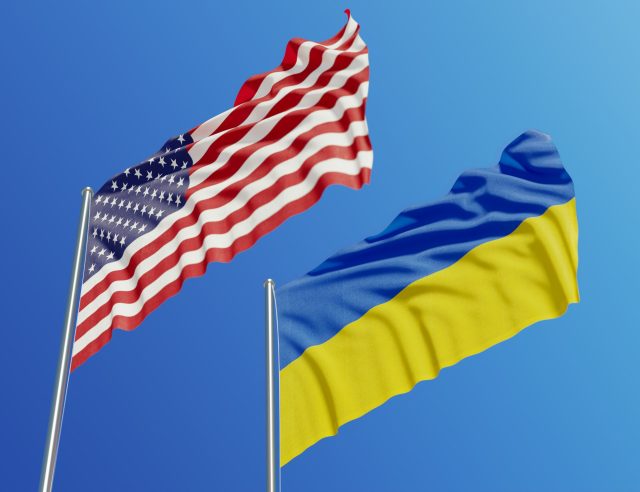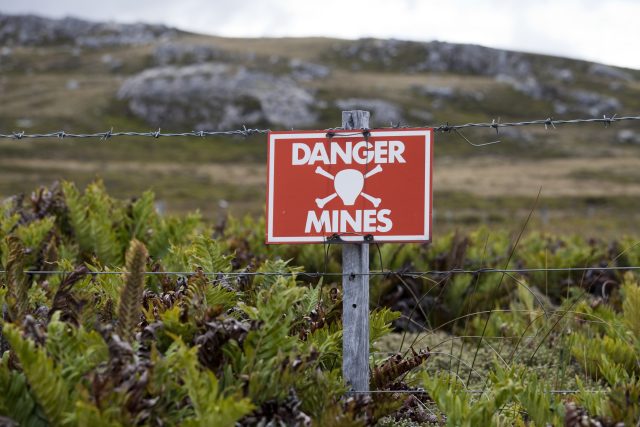Landmines in vineyards bring Ukraine and Napa together
A group of Ukrainian winemakers travelled to California this week to meet one Napa producer whose fundraising helped to remove landmines from vineyards in Ukraine.

Winemakers from Ukraine spent a week in Napa Valley exchanging knowledge and ideas about regenerative farming and learning how they can expand the presence of Ukrainian wine in the US market.
The trip was funded by non-profit organisations Roots of Peace and Rotary International, and winemakers were hosted by the Grgich Hills Estate winery in St Helena, Napa Valley, which was an early adopter of organics with all Grgich’s vineyards certified organic since 2006. Furthermore, the wine estate, which is well-known for its Zinfandel, attained Regenerative Organic Alliance certification last year.
Among the group of visiting Ukrainian winemakers was Georgiy Molchanov, head of the Association of Craft Winemakers in Ukraine’s Black Sea region, and five others including Svitlana Tsybak, Owner and CEO of Beykush Winery.
While the Californians and Ukrainians share a passionate interest in regenerative agriculture, it was something rather more vital that brought them together.
Landmines in the vineyards
For almost a quarter of a century Napa’s Grgich Hills Estate has worked with Roots of Peace to raise funds to clear landmines in war-torn countries, including Croatia, the home country of the wine estate’s late founder Miljenko ‘Mike’ Grgich. In 2000, Grgich was instrumental in providing aid to help make safe the Croatian wine region of Vukovar, which was destroyed during the country’s war with the former Yugoslavia.
Ukraine now finds itself in a similar situation to Vukovar, with around 30% of its land, including many vineyards, blighted by landmines, according to Heidi Kuhn, founder of Roots for Peace. The organisation, in tandem with Rotary International, has provided expertise and supplies to help Ukrainian producers safely detonate mines on their estates.
Ivo Jeramaz, nephew of Miljenko Grgich and a winemaker at Grgich Hills Estate, said he feels deeply for Ukrainians because he understands what it is like to live through war.
“This is just the beginning of a hopeful relationship to literally restore the health of this country,” he said. “I hope that they [the Ukrainian winemakers] not only see how farming can be conducted without harmful chemicals, but also that they’re inspired and that their hope is elevated.”
Partner Content
According to Georgiv Molchanov, the winemakers discussed “how to bring nature, how to bring wines, not harm … into this land.”

Despite Ukraine still being under fire from Russian troops, and many producers being mere kilometres from active fighting, there is still a very real commercial need to grow their businesses.
“People in Ukraine are still alive,” said Svitlana Tsybak, owner and CEO of Beykush Winery in the Mykolaiv region of Ukraine during the Napa visit. “Yes, war is in our soul, in our life, but we need … to live our lives so, of course, we need to work.”
Indeed, the nation’s producers have taken strides during its war years. Trade body Wines of Ukraine held its inaugural UK tasting at 67 Pall Mall in October last year, as well as exhibiting for the first time at London Wine Fair. UK supplier Kingsland Drinks also signed an exclusive partnership to import Ukraine wines into the UK last July.
Ukraine producers also turned their attention elsewhere, and began exporting their sparkling wines to Japan and other new markets via a host of newly formed partnerships.
The international drinks trade has rallied to support Ukrainian producers through a number of initiatives since the beginning of the war with Russia. Champagne Pierre Morlet, for example, enlisted Ukrainian artists to design labels for a special range of bottles, the proceeds of which went to the Main Military Clinical Hospital of the Ministry of Defense of Ukraine, and other mobile military hospitals in the country. Prices of the Champagne started at €380 per bottle.
AB InBev brewed a beer inspired by the popular Ukrainian beer Chernigivske and rolled it out on draught across Los Angeles, New York City, Chicago, Houston, and Phoenix from May 2022, followed by eight other international markets. Profits from the beer sales went to the CARE Ukraine Crisis Fund.
Fine wine auctioneer iDealwine staged a charity auction, comprising more than 750 bottles, with all proceeds donated to Ukraine Amitié, a charity sending financial aid and medical supplies to Ukraine.
Meanwhile, UK spirits importer Emporia teamed up with bars across the UK to serve cocktails made with Ukrainian vodka in a bid to raise £20,000 for the British Red Cross Ukrainian Appeal.
Related news
Strong peak trading to boost Naked Wines' year profitability




